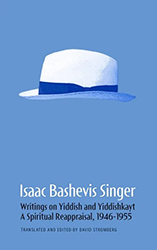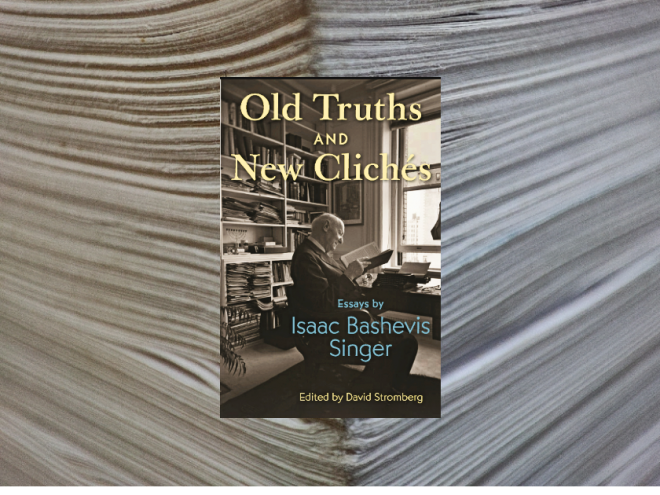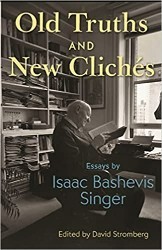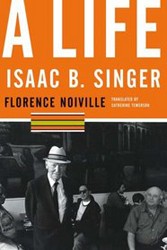What is yidishkayt? As translator and editor David Stromberg explains in the introduction to Writings on Yiddish and Yiddishkayt, “It can mean Judaism, Jewish life, anything having to do with Yiddish culture or language, and … can be Jewishness or even Yiddishness.” While these may all seem like roughly the same concept, taken together, they cover every aspect of Jewry (in this case, primarily Ashkenazi Jewry) — religiosity, history, folklore, language, art, and legacy. The key to understanding the complexity of the Jewish people and Jewish life, especially during World War Two, is to regard yidishkayt not just as an ideology, but also as a way of life that comprises the entirety of the Jewish experience.
This collection of essays by Isaac Bashevis Singer provides a solid foundation for interpreting the questions and themes that plagued many Jews living in America during the Second World War. Singer and his older brother, Israel Joshua, immigrated to the United States right before the war broke out, and were therefore caught somewhere between the “Old” and “New” Worlds — at a time when the Old World was being decimated by the Nazis. These essays are Singer’s attempt to save even a fraction of the world from which he came. He centers his arguments mainly on the importance of Jewish, and specifically Yiddish, literature in preserving Jewish culture. As Singer writes in a 1945 essay, “No other people [except the Jewish people] has as great a chasm between its literature and its life as do the Jews.”
Singer’s essays, many of which were originally published in periodicals like Der Forverts (The Forward), touch on a wide range of topics, from Jewish law and thought to current events. The collection can be broken up into three main categories: informational essays that muse on the customs and history of Jewish life; questions about how American Jews can preserve the elements of Jewish life that are being destroyed in Europe; and essays that reflect on Jews’ place in the world, both historically and in the wake of the Second World War. A focal point throughout all of his essays is Yiddish: Yiddish writers, the spoken Yiddish language, and the culture associated with Yiddish-speaking Jews. He frets over the absence of Yiddish and Jewish knowledge in the minds of American youth, and the intense assimilation that occurred as a result of Jewish immigration to the US. Combined in a book like this, his essays almost become a call to action.
Singer’s collection emphasizes that, while Jewish peoplehood is not a monolith, it has always been interconnected. American Jews would always be affected by the events that were happening an ocean away — just as Torah, Talmud, Kabbalah, and folklore would always provide a foundation for Jewish life. There was no escaping, avoiding, or forgetting the harsh reality of what it was to be a Jew in that moment, in any moment. And yet despite the profound personal and collective sadness that Singer feels, he holds onto his love for and loyalty to his people and culture. This work is a precursor to books such as The Family Moskat, which preserved a picture of Jewish life in Poland.
Writings on Yiddish and Yiddishkayt is an accessible survey of the moment in which Singer was living. It draws from historical sources in a way that readers without too much background knowledge can understand. Singer speaks quite colloquially, often sprinkling Jewish sayings or sarcasm into his analyses. Throughout his career as a whole, he not only lifted up Jewish life, but he also committed it to the memory of the American people. His dedication at the beginning of the book suggests as much: “To the Jews of the Holocaust — those who were murdered and those who survived.” He’s not just talking about literal survivors; he’s talking about the generations that would come later, that would need to remember in order to continue on.
Isadora Kianovsky (she/her) is the Membership & Engagement Associate at Jewish Book Council. She graduated from Smith College in 2023 with a B.A. in Jewish Studies and a minor in History. Prior to working at JBC, she focused on Gender and Sexuality Studies through a Jewish lens with internships at the Hadassah-Brandeis Institute and the Jewish Women’s Archive. Isadora has also studied abroad a few times, traveling to Spain, Israel, Poland, and Lithuania to study Jewish history, literature, and a bit of Yiddish language.





